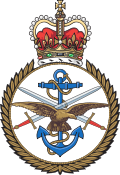| MOD Boddington | |
|---|---|
| Barrow, Gloucestershire in England | |
 | |
| Site information | |
| Type | Communications station |
| Owner | Ministry of Defence |
| Controlled by | RAF Support Command (1978-1998) DCSA (1998-2007) ISS (2007–2019) Defence Digital (2019–present) |
| Location | |
| Coordinates | 51°55′18″N002°09′55″W / 51.92167°N 2.16528°W |
| Area | 2 hectares |
| Site history | |
| Built | 1940 |
| In use | 1940-present |
MOD Boddington is an installation of Defence Digital (formerly Information Systems & Services), an operating cluster of the Ministry of Defence. It was formerly RAF Boddington, a non-flying Royal Air Force station located in Boddington, Gloucestershire, England, and was the former home of No. 9 Signals Unit RAF.
Contents
Boddington was the first computerised communication centre in the 1950s when it was run by the British Army. The tradition of computerised relay communications has continued to the present day. [1]

